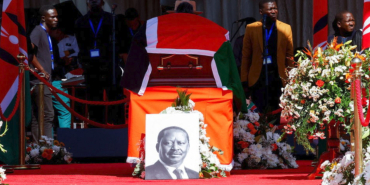Kenya and Nebraska Sign Labour Mobility Deal for Truck Drivers

Kenya and the State of Nebraska have signed a labour mobility agreement allowing licensed Kenyan truck drivers to work in Nebraska’s freight industry.
The agreement was announced at the Kenya-Nebraska Beef Trade and Investment Conference in Nairobi by Roseline Njogu, Principal Secretary for Diaspora Affairs, and Nebraska Secretary of State Robert Evnen. Initially focused on the trucking sector, the pact is intended to expand into agriculture, manufacturing, and education. Nebraska faces a significant shortage of skilled commercial drivers, and this agreement aims to address that gap by enabling Kenyan professionals to fill these roles.
“We began with labour mobility with commercial driver’s licence; these are skilled truck driving positions,” said Mr Evnen. “We have a need for that in the United States; we have the need for that in Nebraska and we have training available in Nebraska.”
The initiative forms part of Kenya’s broader strategy to reduce unemployment, especially among young people, by fostering international employment opportunities. Nebraska, on its part, seeks to attract skilled foreign workers to support key sectors such as logistics and agriculture.
Participation in the programme requires compliance with US immigration laws, including contract-based residency and mandatory return to Kenya after completing the work period. Any violation of legal or criminal codes results in immediate deportation, underscoring the emphasis on lawful participation.
During the conference, both parties discussed potential collaboration in agriculture, including the possible introduction of Kenya’s Mkulima Majuu programme to Nebraska. This would enable Kenyan farm managers and agronomists to contribute to Nebraska’s farming industry, reflecting the state’s agricultural profile and interest in skilled migration. Mr Evnen also announced the creation of a joint committee to oversee the initiative, assess evolving labour needs, and streamline the programme’s implementation.
“We have a committee that would meet periodically for planning purposes to identify needs and to identify processes and pathways to make this happen,” he explained.
The conference further addressed issues related to the beef value chain, such as veterinary services, animal nutrition, cold-chain logistics, and certification standards. Participants included government officials, private sector representatives, researchers, and diaspora groups from both countries.
Kenya has intensified efforts to create overseas job opportunities. Recently, PS Njogu led a delegation to Germany to negotiate a deal expected to fill over 200,000 vacancies.








Comments
I would love to join truck…
Permalink
I would love to join truck drivers in Nebraska
Add new comment